Beloved Baby Face
Spanish fans adore him. He is friendly to every person who wants a picture or autograph, and has a...
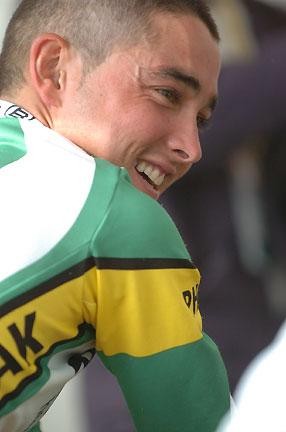
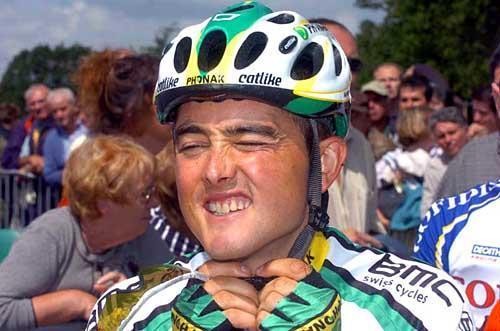
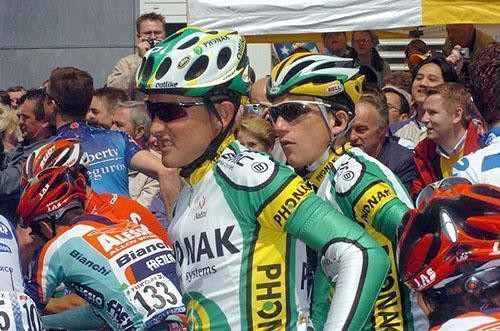
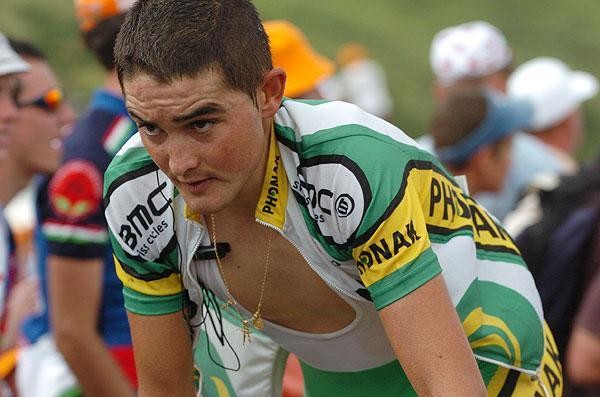
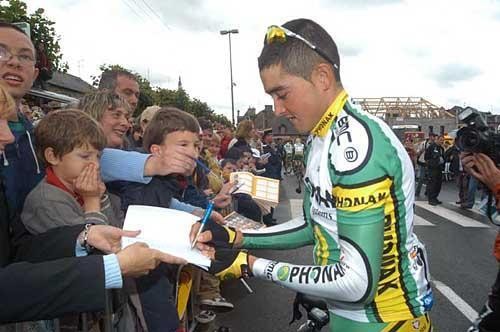
An interview with Oscar Sevilla Ribera, August 9, 2004
Spanish fans adore him. He is friendly to every person who wants a picture or autograph, and has a cheerful and happy way about him. "I feel proud of being liked by the fans. Feeling loved is the nicest thing in the world," he says.
Ever his eleventh hour defeat at the 2001 Vuelta a España though, Oscar Sevilla has been troubled with injury and bad luck. But 'Baby Face' is ready to show his critics he isn't finished. By the end of this year's Vuelta, Sevilla wants to say to his supporters: "OK fans, you love me and this triumph is for you".
Cyclingnews: The Tour de France is over. Was it good for you?
Oscar Sevilla: I've come to a number of conclusions about the Tour. First, on the sporting side, I ended up happy because my performance was as I expected to be. Personally, I felt satisfied because I was able to finish the race. Almost no one knows, but I suffered a cracked rib and I had to have surgery on one of my knees after the Tour. I had a problem in my knee because of the fall I suffered in the race's first day. So, I rode injured almost the whole race.
Actually, I felt bad psychologically as well as in my body. I was not able to ride in the front of the peloton because of my injury, and I thought my place in the race wasn't right, being so far behind in the peloton. I wanted to ride in the front, attacking, trying to get in the leader's group, and I wasn't able to achieve that in any part of the race. I rode the whole race suffering on the bike, chasing the others, and I actually had a very bad time.
CN: How did you feel being one of Tyler Hamilton's soldiers?
Get The Leadout Newsletter
The latest race content, interviews, features, reviews and expert buying guides, direct to your inbox!
OS: I accepted it. I prepared myself for the Tour knowing that Hamilton was a big candidate for the final victory and I think that I and the rest of the team were convinced about that.
We knew our place in the team and I think Tyler was happy with all of us. We stayed together, we worked together, sheltering Tyler from wind, from pave and from the crashes on roads I dislike during the first and second week. And the truth is that Hamilton was happy with the team. We had many problems later though, beginning with the team time trial, then Tyler's crash and my own crash. It was a truly difficult Tour de France for Phonak.
CN: The Tour had many accidents for you, right?
OS: Right. First, we lost Tyler from the race. As I said before, we were convinced he was able to fight for the final win or at least to stay very close to [Lance] Armstrong [US Postal Service - Berry Floor]. And suddenly, everything was over with the crashes. I think we could have won the team time trial, but we had so much trouble that everything was screwed up.
CN: How is your relationship with the other two stars of the team like Alex Zülle and Tyler Hamilton?
OS: Very well with Alex; Alex is racing his last year in his cycling career. He is great rider and he was important in cycling. I respect him a lot. I stay with him every time that I can for him to give me advice, to teach me and I have great admiration for him. I think he is a great rider and I believe one can learn a lot from the big stars.
The same with Tyler - Tyler is a great rider, and I should say he is a very good teammate. He cares about everything, about every rider, about the technical things on bikes. He wants us to be happy; he wants us to work with joy. I think we have a very good [team] environment thanks to all and to Tyler because he cares about all of us. He looks not only after himself, but also after the rest of the team. We are very happy to work not only for a teammate, but for a friend. Because I consider I have a 'friend' relationship with him.
CN: So, I suppose your change from Kelme to Phonak was positive for you.
OS: Very positive. Although bad luck follows me all the time, it was very positive. When I just signed for Phonak I had some doubts because I didn't know how I could adapt myself to a foreign team. Besides, I was fine in Kelme.
However, it was truly wonderful since the moment I joined the squad in a team training camp in Switzerland last November. Everyone treated me very well: the riders, the technical team, Phonak's people. All the people are marvellous and I think it's a team with a big future. I hope Phonak will be the number one team because of the quality of people. And I think the good relations inside the whole team are very important in order to succeed. The good environment is our biggest asset in Phonak.
CN: What do you think about the Manzano and Kelme affair, considering you were part of this team until 2003?
OS: At first I felt, I don't know how to say it... very bad, because he made very serious accusations that may harm a sportsman. I think of myself as a healthy sportsman and I made a big sacrifice in order to reach the place I occupy now. Everything seemed to be really blasé the way Manzano told things. Everyone was supposedly doping, using a needle. I believe he was filling people's minds with untrue things.
The people who know us, the cyclists, know we sacrifice ourselves very much, we train very much, we make things right. Manzano just talked about doping. Doping always existed and will always exist. But it's also true that is a small thing and that sooner or later cheats are caught. I think Manzano wanted to take revenge on Vicente Belda [Kelme's sporting director], Kelme's management and medical staff. I think he harmed cycling very much; I think he just wanted to harm these people. He talked about many savageries, many things I've never seen. I spent six years on that team and I can guarantee that, and I am confident about what I am saying.
I think he talked about many things without any evidence and the saddest thing was the attention the media paid to him. The As newspaper paid him attention without evidence and that's very harmful for many people, for many cyclists, for many children who hope to become cyclists. We are willing to do everything, to make blood controls and urine controls, out of race, by surprise, whatever. And we are proud of that. It is really sad to be treated the way we were treated because of this rider's declarations who is unknown to most of the people. But if there's someone who is guilty, that person must pay.
CN: How are you preparing for this year's Vuelta?
OS: I have many expectations, but also a lot of anger. I have a lot of anger to demonstrate to many people who say, 'Sevilla's career is over, Sevilla is nobody now.' I am the only one who knows the things I am going through. I am having many problems.
When one feels bad, when one is injured, when one is not able to train well, when one is not able to ride like one should, these are the bad moments a sportsman has. Those moments are very hard and some people do more harm instead of helping that person. I have many friends thanks to God, many people who keep on trusting on me and I really desire to do well in the Vuelta a España.
As I told you before, I underwent surgery to my knee four days after the end of the Tour de France. Now I need to rest. I will start training next Monday, though I think it is rather early. The Tour was very hard and these days of rest won't be bad for me.
CN: I guess you owe yourself some revenge in the Vuelta after that second position in 2001 and the many physical difficulties you had last year?
OS: Yes, sure. I was very close in 2001, but I was very young. I was not very aware of what I had done because everything came to me very fast and I didn't realize what I was doing. I wore the leader's jersey on many stages, but then I had some problems with my team and ended up fourth in 2002. I consider I could have reached the podium that year. Last year I had many crashes and problems. I think I am mature now; I'm 27 years old and I already know what I want.
As you say, it is something I need to change and I hope if not this year that I win next year. I think that Oscar Sevilla has the Vuelta a España in his legs. I am a rider who was not able to train like I can know and how I wanted in the last two years. I consider that my biggest strength is that I know what sacrifice is. Sacrifice to train myself, to be careful in every aspect, to often be far from home. And this is very important, so the only thing I ask for is the health to do it. I think I am able to win a Vuelta a España!
CN: You are beloved by cycling fans, especially in Spain. Why do you think this is? You are maybe the rider most fans identify with, right?
OS: Yes, and luckily [the Vuelta] is the best race for me to win with so many people who love me and cheer me. I would like to win the Vuelta a España once for these people, for all these people who cheer me and are beside me. Feeling loved is the nicest thing in the world. I like to sign in autographs and pose for pictures with my fans in every race because I appreciate very much the treatment they give me. Thanks to them, one has strengths to overcome the bad moments.
CN: If you are able to achieve a final victory in the Vuelta or the Tour you could become the new Pedro Delgado or the new Miguel Induráin of the Spanish cycling.
OS: Yes, it's really difficult to equal their achievements, especially Induráin's feats. I guess "Perico" [Delgado] did very much for cycling in this country [Spain]. Thanks to him, I am now a cyclist because I remember watching him in '88 when he was there fighting. And the truth is that I have great admiration for Delgado. He is my idol and I hope I am able to become just a bit what he was. He is my idol as a rider and also as a person. He is a great person, he gives me much advice and I hope some day people compare me with Delgado, but I have to earn that.
CN: Are you going to ride some races before the Vuelta?
OS: I don't know, it depends on my knee. If I recover, I will begin training next Monday. I will probably ride some races this month like some one-day classic in Spain like the Clásica de los Puertos or the Luis Ocaña trophy. Then I guess those in the team will have a training camp to prepare for some of the important and difficult stages in the Vuelta that we don't know, like the one in Almeria and Sierra Nevada. So we can train together and see them.
CN: What do you think about the Vuelta's route?
OS: It's difficult, but it's a route that doesn't pass through the Pyrenees or Asturias where Spain's hardest climbs are. However, there are some tough stages, especially in Alicante, Murcia and Andalusia, where there are neither big climbs nor a flat metre. The road is full of little uphill and downhill climbs. I think the race will be hard because of the heat too.
The last week is very hard with the climb to La Covatilla, then the Avila stages and the stage in the Madrid sierra that are crucial. I guess the last time trial in Madrid will be the decisive stage. The first three or four days will be the only flat ones, but one must be careful with wind. We will have little uphill and downhill climbs and very tough short mountain stages.
CN: You said the final day in the Vuelta will be crucial. So you must get in the best possible position in the GC before the last time trial stage in Madrid?
OS: As I reach the start of the Vuelta not in my best condition, I will try to pass through the first week the best I can. It will be a week with flat stages and much wind and I will try to get in my best shape. I will try to get some advantage in Almeria and Sierra Nevada to be in front for the last time trial.
I guess I will also attack in La Covatilla and in the Madrid sierra that are the toughest stages. The Madrid sierra is hard as we have saw last year when [Isidro] Nozal lost the Vuelta in there. This stage in Madrid is not excessively tough, but the tiredness may show up in many riders. And then my goal would be to have a good margin to face the final day, although I like this last time trial. It's like the world championships in Madrid, made for specialists but with hills and curves.
CN: But let's hope things don't happen like in 2001.
OS: I hope so. But I think I would like to begin the final time trial with the same advantage that I had that year.
CN: Really?
OS: Yes, that year I had a problem with my bike and that harmed me a lot, so I became very nervous. I was very young and immature. I didn't react very well. I think that today, with my experience and my spirit of sacrifice, I would die over the bicycle. I would like to face the same situation this year.
CN: How is your relationship with Alvaro Pino?
OS: Oh, very well, really well. He was the one who brought me to Phonak. I was thinking whether or not to come to Phonak and he made me decide to come. He was vital for my change of team because I knew him since my times in Kelme. He taught me a lot and he gave me the opportunity to ride for Kelme. He is a great director and a good friend.
In Kelme as well as in Phonak, he taught me a lot of things. He is a person who hears you, who likes to teach. One can talk openly with him, give him one's opinion. He is a very good director who is serious when he must be serious, but who is also a friend beside me when I need him.
CN: Apart from you, who are the candidates to win the last Grand Tour of 2004?
OS: I think that this year many riders will have big chances of winning the Vuelta after we saw what Armstrong did in the Tour, where he left nothing for the rest of the riders. Liberty Seguros with Roberto Heras was the most damaged team with Armstrong's big show and they will be very interested in overcoming this bad performance. Also [Alexandre] Vinokourov and [Danilo] Di Luca and some others.
I would also mention Alejandro Valverde. Valverde is not surprising me because I've known him for a long time and he is a good friend of mine. I know Alejandro is a rider with much quality. What really surprises me is the speed how he is achieving everything. However, Alejandro is preparing himself for the Olympic Games and that means he will start the Vuelta a bit tired, but he is a high-quality cyclist and he must be included in the candidates' list.
Heras, Vinokourov, Di Luca and Valverde will certainly be in the top positions. And there may be room for a rookie rider for a breath of fresh air. I hope I am in the big fight with the rest of the top cyclists and we will see who is the strongest.
CN: Will you race after the Vuelta?
OS: Yes, I would like to ride the world championships because I will be in good shape by that time and also because I will probably be not too tired in that part of the calendar year. And also Lombardia and Milano-Torino and the Giro del Piemonte. Especially Lombardia, because I raced it last year and I liked it very much. It's a race I would like to ride. To win there is very difficult but I think I will be among the top positions.
Other Talking Cycling Interviews